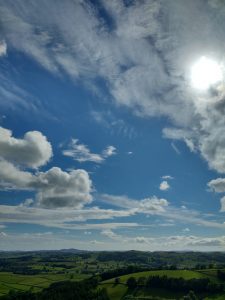I’m so glad this book exists.
And precisely because it’s an insightful, useful, empathic, warm, inspiring and encouraging book—which completely fulfils the “we read to know we are not alone” brief, and which I don’t hesitate to recommend wholeheartedly—I’m going to get my tiny bits of objection out of the way first. Then I can get on with saying why I think it’s so good.
I can’t help hoping that the first word of the title, and the subtitle, were foisted upon the author by an editor or publisher who didn’t quite get the point. I find the word “Rocking”, and the determined jauntiness of “12 weeks to your plan B”, a little ‘the lady doth protest too much’.* Ms Day’s book sensitively, faithfully and compassionately refuses to elide the pain of those who are what she calls childless-by-circumstance—ie those who have not chosen childlessness. (Ms Day calls those who chose not to have children the “child-free”, which is a useful distinction). That it honours what is is to be without children—particularly in this, our very family-centric culture—and that it insists upon the depth of the grief to be felt for what has not been, is a large part of the book’s appeal. To have the subtitle imply, then, that there is some swift bypass round doing the work of grieving does not do justice to Ms Day’s sensitivity and insight, nor to the experience of the grief in itself. In her important and necessary book, Ms Day manages to unpack all that can lie behind ‘Me? Oh, I don’t have any children’ without ever descending into Victimness. Wonderful, inspiring, necessary.
The opening sentence broke me open (all over again) when I first read it: “This book is for all the mothers who don’t have children”. (I just teared up when I typed it out!) For me, there is something so redemptive, and therefore precious, about the idea of retaining that part of my identity, even though it is not manifest in the world in the obvious or usual ways. In chapter one also, her list of “Fifty ways not to be a mother (With apologies to Paul Simon)” is also extraordinary valuable; I recognised myself in many of the entries. While I found some of the practical exercises less striking for me personally—I’m already committed to personal development work, partly because of my profession and partly because, well, I’m worth it—I think they offer useful structures for reflection; and the support Ms Day offers to help us see our childlessness in a political context is also inspiring. I absolutely loved, too, the section exploring the different stereotypes which childless women may fear. Apparently “Mad Cat Woman” seems, at Ms Day’s workshops at least, to be the most feared. (And that certainly resonates for me!).
and the support Ms Day offers to help us see our childlessness in a political context is also inspiring. I absolutely loved, too, the section exploring the different stereotypes which childless women may fear. Apparently “Mad Cat Woman” seems, at Ms Day’s workshops at least, to be the most feared. (And that certainly resonates for me!).
Rocking the life Unexpected is, for me, a book to be taken slowly, as and when I am up to it. I trust my instincts as to when it’s time to read the next bit, or to re-read bits. I haven’t finished it yet, then, and I definitely haven’t finished the emotional work that it honours and recognises. But the book has been a part of me being able to identify some of the details in the grief and fear I’ve had to work through. It’s also been a huge part of me feeling less alone, less “other”, less weird in what I’m going through. And for that I will always be grateful.
Finally. .. I now feel more okay about sometimes being irritated by conversations about other people’s children—conversations in which I will never be able to have a fully-reciprocal part. Boy, am I glad I can now quietly, mentally, roll my eyes and say ‘Enough already’. Thank you, Ms Day. Thank you.
*(I believe the latest editions have replaced the word “rocking” with “living”, which I think is much more true to the book as a whole).

 I enjoy the gradual acclimatisation process, and the way I eventually reach a point where postponing the gasp-inducing full plunge becomes worse than enduring it. On this beach, however, you have to let go of any vision of strolling casually or lingeringly across white-gold sand into lapping clear blue water as your footprints dissolve beautifully behind you.
I enjoy the gradual acclimatisation process, and the way I eventually reach a point where postponing the gasp-inducing full plunge becomes worse than enduring it. On this beach, however, you have to let go of any vision of strolling casually or lingeringly across white-gold sand into lapping clear blue water as your footprints dissolve beautifully behind you.  and the support Ms Day offers to help us see our childlessness in a political context is also inspiring. I absolutely loved, too, the section exploring the different stereotypes which childless women may fear. Apparently “Mad Cat Woman” seems, at Ms Day’s workshops at least, to be the most feared. (And that certainly resonates for me!).
and the support Ms Day offers to help us see our childlessness in a political context is also inspiring. I absolutely loved, too, the section exploring the different stereotypes which childless women may fear. Apparently “Mad Cat Woman” seems, at Ms Day’s workshops at least, to be the most feared. (And that certainly resonates for me!). It’s in the post. Should I hire trumpeters, skywriters, a marquee? A cloistered cell in which to grieve? Do I want a Greek chorus to keen over the event, or a Glee chorus to celebrate it? Do I don some kind of ritual clothing, à la Victorian mourning garb, or go out and buy whatever constitutes my personal equivalent of a combover, a sports car or a push-up bra?
It’s in the post. Should I hire trumpeters, skywriters, a marquee? A cloistered cell in which to grieve? Do I want a Greek chorus to keen over the event, or a Glee chorus to celebrate it? Do I don some kind of ritual clothing, à la Victorian mourning garb, or go out and buy whatever constitutes my personal equivalent of a combover, a sports car or a push-up bra? I heard a voice inside my head go Cor, in an almost Phwoar-y kind of a way (swiftly followed by a quiet, greenly-jealous voice saying I wish I’d written that). Though Frost is probably not, in fact, saying something very different from “You can’t put an old head on young shoulders”, there’s something so much more palatable for me in coming across the idea in this form;
I heard a voice inside my head go Cor, in an almost Phwoar-y kind of a way (swiftly followed by a quiet, greenly-jealous voice saying I wish I’d written that). Though Frost is probably not, in fact, saying something very different from “You can’t put an old head on young shoulders”, there’s something so much more palatable for me in coming across the idea in this form;